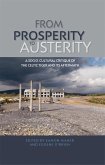In an age of financial globalization, are markets and democracy compatible? For developing countries, the dramatic internationalization of financial markets over the last two decades deepens tensions between politics and markets. Notwithstanding the rise of left-leaning governments in regions like Latin America, macroeconomic policies often have a neoliberal appearance. When is austerity imposed externally and when is it a domestic political choice? By combining statistical tests with extensive field research across Latin America, this book examines the effect of financial globalization on economic policymaking. Kaplan argues that a country's structural composition of international borrowing and its individual technocratic understanding of past economic crises combine to produce dramatically different outcomes in national policy choices. Incorporating these factors into an electoral politics framework, the book then challenges the conventional wisdom that political business cycles are prevalent in newly democratizing regions. This book is accessible to a broad audience and scholars with an interest in the political economy of finance, development and democracy, and Latin American politics.
Dieser Download kann aus rechtlichen Gründen nur mit Rechnungsadresse in A, B, BG, CY, CZ, D, DK, EW, E, FIN, F, GR, HR, H, IRL, I, LT, L, LR, M, NL, PL, P, R, S, SLO, SK ausgeliefert werden.









